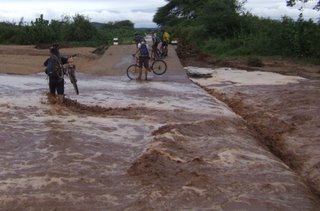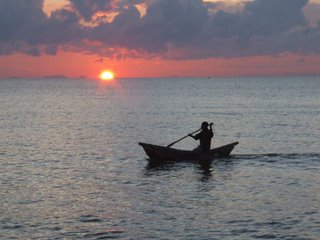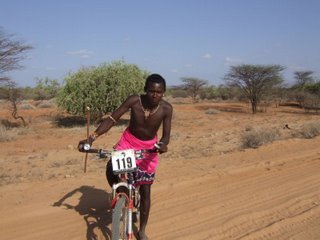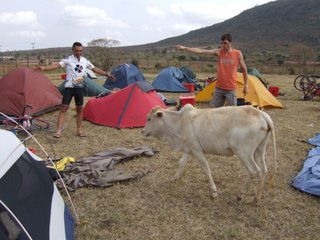Wednesday, April 05, 2006
Lilongwe





I have officially switched from a ‘racer’ to a ‘leisure rider’. I raced the first 3 or 4 countries quite intently, slacked off a bit in the last 2, and have now seen the light, along with many others who shared my approach. I came here to experience Africa and to think. While the competitiveness of racing is entertaining, the problem is that bicycle racing always involves riding in a pelaton, or tight group of riders, wherein you are inches off other riders’ tires and have to watch your speed and your competitors intently and continuously. This makes it very hard to check out the scenery, talk to the locals, or think during the 7 hours of daily riding. Now, riding mostly on my own, I take everything in, stop when I see something interesting, and often enough stop for an additional snack along the road with other (former racer) leisure riders and generally take a little longer to get to camp. This does nothing to change my EFI status (having ridden Every F’n Inch – which is becoming more and more exclusive), it just means my times aren’t ranked. I will stay EFI, this is just a recent act of straightening out my priorities that I am happy with and thought I would share.
It has rained every day and every night since Arusha, which is almost 2 weeks now, and it will likely continue to do so for another week. It’s not continuous, like Noah’s flood or anything, but being the rainy season, the skies break open every few hours in between sun and clouds. Now that I’m not racing I can actually stop to put my rain jacket on (although I have a system to do it while riding as of yesterday). Malawi has been great riding, probably my favorite thus far (paved roads and great scenery). The people are pretty much on par with previous unremarkable country cultures (they stare, say hello, beg, and will sell you things if you ask).
One thing about the people has gotten me down of late, actually (this is where this episode turns to social commentary - just warning you now). I made an earlier comment about how women do all the work (perhaps) due to the evolution of the culture from slavery as the stronger people (men in rural culture) idealize the slave-driver and make the weaker (women in rural culture) do the work. Another historical difference between Africa and Western culture is that Western culture evolved from tribes in slow steps – tribes to communities, communities to fiefdoms, to kingdoms, to countries. Africa was forced from tribes to countries in one fell swoop by outside interference. The result is that equitable leadership and organization of a large and diverse group isn’t understood. When someone is put in power in Africa, they use whatever benefits they have to benefit their tribe - their family and friends - everyone else be damned. We’ve seen this endlessly in government, but it also seems to happen in charity.
A couple on out trip are sponsoring a child through a help organization that works with 27,000 kids in Malawi. They wanted to see where their money was going. Three representatives from the organization showed up in a brand new land cruiser to collect the money, but when it came to meeting the family it was more difficult. They did, in the end, arrange to meet the child and the family they had a heart-warming experience, particularly to do with the kids and the women who take care of them. The father, who does nothing all day while his three wives work the fields, asked for more money to fix the roof of the hut so that the child wouldn’t get wet. While the experience was unique and genuine, the donating couple wasn’t convinced that the money does any good in the end. The organization (whose representatives rock up to tiny villages in fully loaded brand new land cruisers) was unable to show any tangible improvements that the sponsored children experience, to do with life expectancy, time spent in school, or anything else. They claim that the problems the children face are complicated, which they certainly are. 75% of the population of Malawi is under 15. Life expectancy is 27 years. The men do not do any work. Children are raped and infected because it is believed that you can get rid of aids by having sex with a virgin. Money that is brought in to help is siphoned off by people helping themselves and their friends, but not the people who are supposed to be helped.
While this might sound like a call to action to do something for Malawi, it may be true that the exact opposite approach would be better. I have been learning that after 50 years of foreign aid in Africa the situation is no better. Ethiopia is the country that received the most food and aid money and now citizens seem to do nothing but beg and hang around food distribution centers. Kenya and Tanzania had millions of trees planted by NGOs that grew twice as fast and reaped better lumber, but these killed all the local foliage and animals and caused forest fires previously unheard of. If the harvest is really bad one year in Malawi, rather than the men having to work the fields too, foreign aid steps in with an answer. It may be that I am disgruntled by the thousand or so people I pass on the road every day wanting something from me, but I’m not convinced that giving it to them is the answer anymore. The problems are, well, complicated.
But the trip has been enjoyable lately when that’s not on my mind. We’re going to try to have more and more fun events and the more leisurely approach to riding is much healthier and allows for much more reflection and enjoyment. I am looking forward to being joined by my friend Tom 'Danger' Baxter in Victoria falls for the last quarter and we have now completed over 2/3 of the riding days. We will fly across flat desert in Zambia and Botswana and as we get further south the culture allegedly gets more and more South African (mmm… chocolate milk at rest stops), which comes with interesting social and cultural issues. I’m pretty well ready for a change and looking forward to getting home, so on we go.
